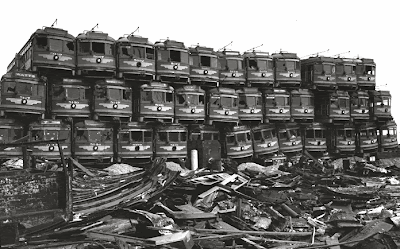While now-a-days
there are more cars
than people, Americans used to prefer public transportation. The public,
including rich urbanites, used to think that owning a car was a
nuisance.
In the early to mid 20th
century, America was urbanizing fast and the public transit systems
were exemplary, with ferries, cable cars, trains, and other forms of
fast transport.
Car and oil
executives saw theirs profits taken by good city planning. In
response, these companies collaborated to buy
out transit lines,
which were privately owned and generally fairly cheap. Motor and oil
companies replaced the efficient public transportation systems with
diesel buses, which were more expensive and less accessible. This
takeover was especially wide-spread in California.
 |
| Streetcars at a landfill in Los Angeles County, March 1956 |
America became a
country dedicated to cars against its will; the protests of those who
loved the old transit system were unsuccessful.
Oil and car
companies also convinced the federal government to subsidize a $41
billion national highway project. They collaborated with the
military, which needed a complex transit system for national defence.
Meanwhile, the newly built suburbs never had access to public
transportation.
Within a short
period of time, Americans embraced the car. Perhaps mass consumption
appeals to the American ethos. Or maybe America was merely
manipulated that way.